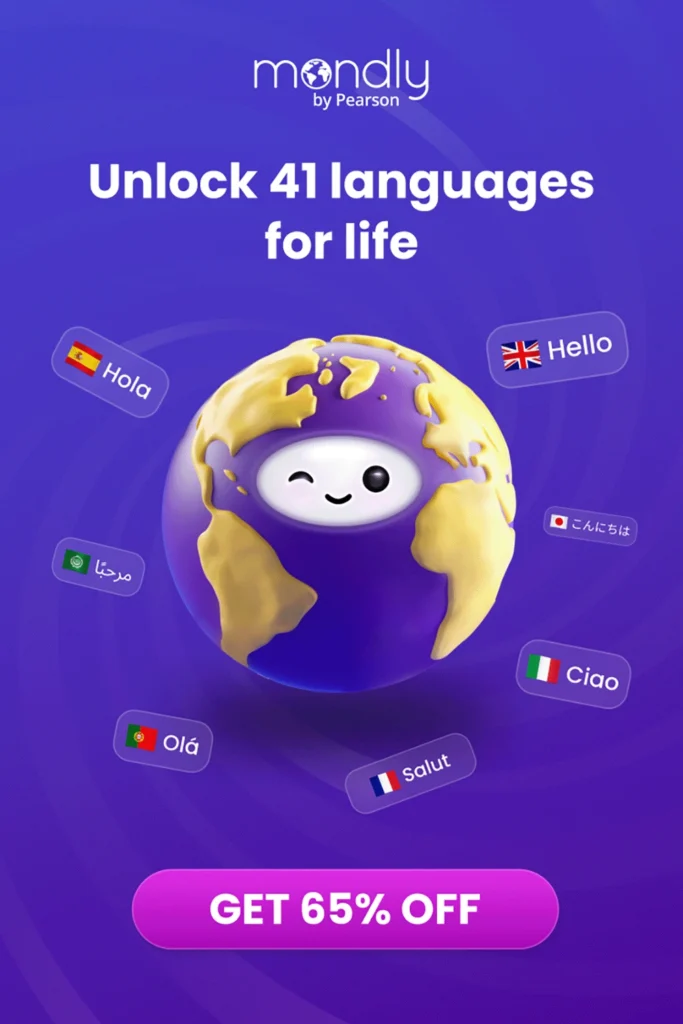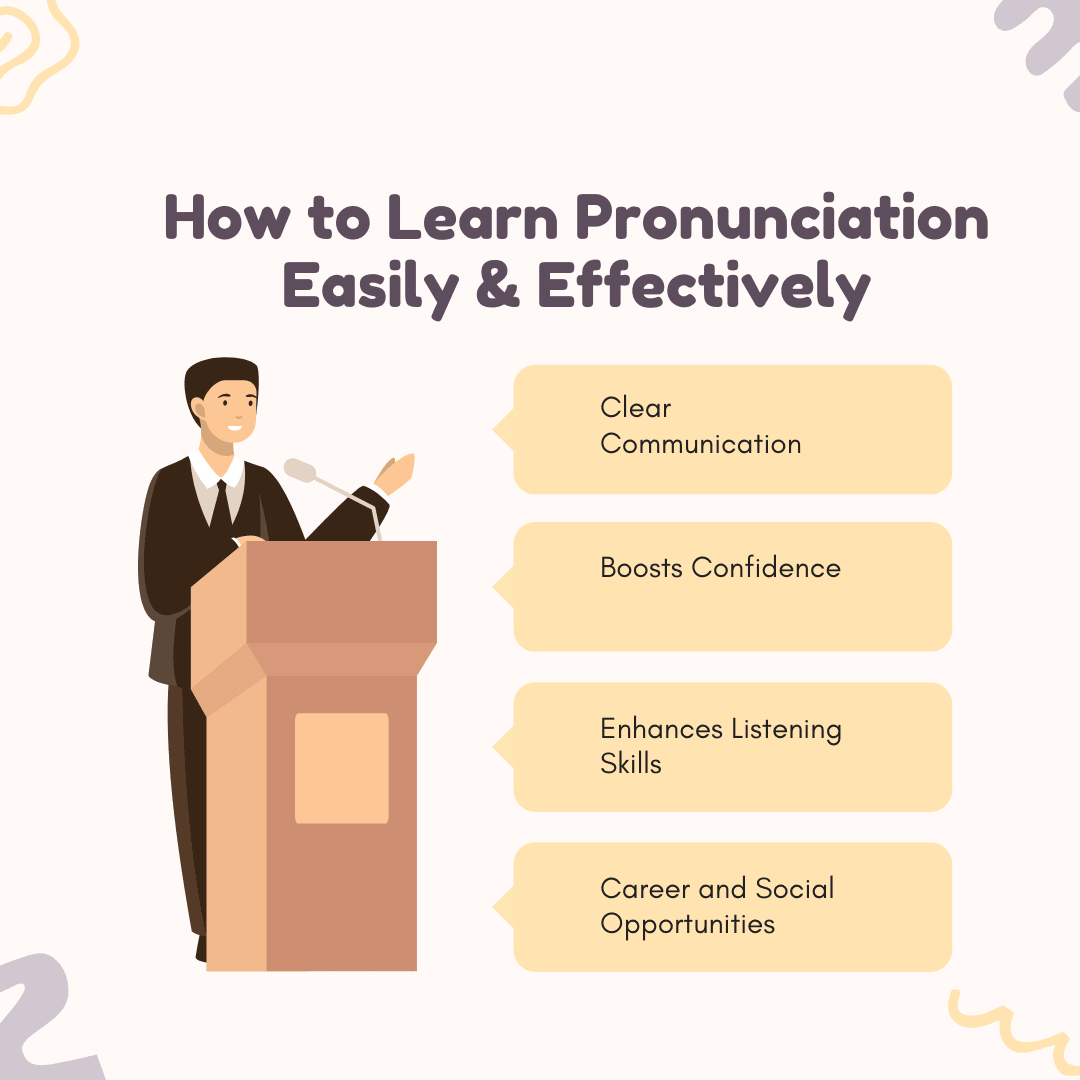Introduction
When I first started learning English, one of the hardest things for me was figuring out how to learn pronunciation the right way. Even when I knew all the words, my accent and unclear sounds often made it difficult for others to understand me, which sometimes shook my confidence. Over time, I realized that pronunciation isn’t just about speaking fluently—it’s about being understood, connecting with others, and feeling more confident in any conversation.
Through lots of trial and error, I experimented with different strategies and tools, gradually improving my clarity and comfort when speaking. In this guide, I want to share what I’ve learned: why pronunciation matters, the methods that really work, and practical tips you can start using today to speak clearly and confidently.
Why Pronunciation Matters
Good pronunciation is about more than just sounding “correct.” It directly affects your ability to communicate clearly and be understood by native speakers. If you’re wondering how to learn pronunciation effectively, understanding its importance is the first step. Here are some key reasons why focusing on pronunciation can make a real difference in your speaking skills:
Clear Communication
Getting words wrong can easily cause confusion or misunderstandings. By focusing on pronunciation, you make sure your message comes across exactly as you intend, helping others understand you effortlessly.
Boosts Confidence
Knowing that you’re pronouncing words correctly gives you a huge confidence boost. Whether you’re chatting with friends, giving a presentation, or interviewing for a job, clear speech helps you feel more self-assured.
Enhances Listening Skills
Working on pronunciation doesn’t just improve your speaking—it sharpens your listening too. Learning the correct sounds trains your ear to notice subtle differences, making it easier to understand native speakers.
Career and Social Opportunities
Accurate pronunciation opens doors. In professional settings, networking events, or casual conversations, speaking clearly makes you sound competent, approachable, and ready for new opportunities.
Top Options and Tools to Learn Pronunciation
When it comes to how to learn pronunciation, picking the right method can make a huge difference in your progress. The good news is there are plenty of effective tools and strategies that can help you practice, improve, and gain confidence in your speaking skills. Here are some of the top options to consider:
1. Language Learning Apps (e.g., Mondly)

Pros:
- Interactive lessons feature audio from native speakers, helping you hear and mimic accurate pronunciation.
- Built-in speech recognition gives instant feedback, so you can quickly correct mistakes as you practice.
- Gamified elements make learning fun and keep you motivated to practice regularly.
Cons:
- Some of the advanced features might require a premium subscription.
- While very helpful, this type of tool can’t completely replace real-life conversation practice.
Mondly is an excellent choice for beginners and intermediate learners who want to know how to learn pronunciation effectively. Its AI-powered speech recognition lets you practice speaking and gives you instant feedback, so you can spot and correct mistakes in real time. With regular use, you’ll notice your confidence and clarity improve faster than you might expect.
2. Online Pronunciation Courses
Pros:
- Lessons are structured to cover everything from individual sounds to stress and intonation, giving you a complete approach to pronunciation.
- Many courses are taught by certified language teachers, so you’re learning from professionals who know what works.
Cons:
- These courses can be on the expensive side.
- They require consistent practice and motivation to see real improvement, so commitment is key.
3. YouTube Tutorials
Pros:
- You get free access to thousands of pronunciation lessons, making it easy to practice anytime.
- Lessons often include both visual and auditory guidance, which helps you see and hear exactly how words should be pronounced.
Cons:
- The quality of lessons can vary, and sometimes the information isn’t entirely accurate.
- These platforms usually lack interactive feedback, so you won’t get real-time corrections on your mistakes.
4. Language Exchange Partners
Pros:
- You get real conversational practice with native speakers, which helps you sound more natural and confident.
- Along the way, you also pick up cultural insights that make your speech and interactions more authentic.
Cons:
- Finding times that fit both your schedule and the tutor’s can sometimes be tricky.
- Feedback isn’t always structured, so you might need to pay extra attention to what to focus on during practice.

How to Choose the Best Pronunciation Tool
Choosing the right tool for improving your speech depends on your goals, learning style, and available resources. If you’re wondering how to learn pronunciation effectively, this checklist can help you make an informed decision and pick the method that fits you best:
- Interactivity: Can you actively practice speaking with the tool, or is it mostly passive listening? Real speaking practice makes a huge difference when learning pronunciation.
- Feedback: Does the tool give you instant corrections or guidance when you make mistakes? Getting timely feedback helps you improve faster.
- Content Quality: Are the audio examples clear and spoken by native speakers? High-quality audio makes it easier to mimic sounds accurately.
- Flexibility: Can you practice anytime and anywhere, at your own pace? A tool that fits your schedule keeps you consistent and motivated.
- Motivation: Does it keep you engaged with gamification, progress tracking, or fun challenges? Staying motivated is key to seeing real improvement.
For many learners, combining a tool like Mondly with conversation practice provides the fastest and most sustainable results.
Tips & Best Practices on How to Learn Pronunciation Faster
If you’re serious about improving your speaking skills, it helps to have clear strategies in place. Here are some actionable tips on how to learn pronunciation faster and more effectively. These methods aren’t about perfection—they’re about building habits that help you speak clearly, be understood, and gain confidence:
1. Listen Actively
Pay close attention to native speakers in movies, podcasts, or language apps. Mimic their intonation, rhythm, and stress patterns.
2. Record Yourself
Recording and comparing your speech to native speakers helps identify areas of improvement.
3. Break Down Words
Focus on syllables, stress patterns, and mouth movements. This technique is especially useful for difficult words or sounds.
4. Practice Daily
Consistency is key. Even 10–15 minutes of focused pronunciation practice daily can lead to noticeable improvement.
5. Use Tongue Twisters
They are fun exercises to improve articulation, speed, and clarity. Start slow, then gradually increase speed.
6. Combine Tools
Use apps like Mondly for structured practice, YouTube for listening, and conversation partners for real-world application.
Conclusion
Learning pronunciation isn’t about sounding flawless—it’s about making yourself understood, speaking confidently, and opening doors to new opportunities. If you want to know how to learn pronunciation effectively, the key is using the right tools and strategies. Apps like Mondly can guide you, while structured practice methods and consistent application of practical tips make a real difference.
Start small, practice regularly, and focus on clarity rather than perfection. If you’re wondering how to learn pronunciation effectively, a few smart habits can help you improve steadily and communicate more confidently in any situation. Remember, clear and confident speech isn’t a dream—it’s just a few steps away.

FAQ: How to Learn Pronunciation
How can I learn pronunciation quickly?
Focus on daily practice with tools like Mondly, mimic native speakers, and record your speech for feedback.
What is the easiest way to learn pronunciation at home?
Use interactive apps, watch videos, and repeat sounds aloud to train your mouth and ear.
Can pronunciation be learned without a teacher?
Yes, with consistent practice, interactive apps, and listening to native speakers, self-learning can be very effective.
How long does it take to learn pronunciation?
It varies by learner, but with daily practice, noticeable improvement can occur within a few weeks.
Are apps like Mondly effective for pronunciation?
Absolutely. They provide real-time feedback, structured lessons, and speech recognition, making them ideal for beginners.
Read More
